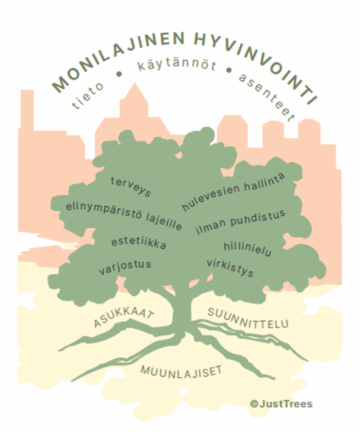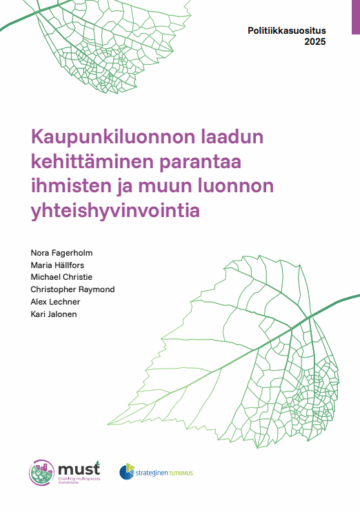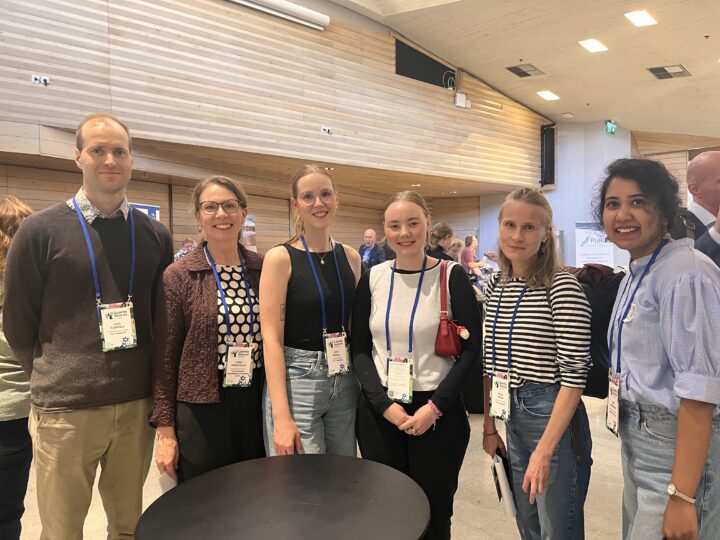As researchers at the Nature Forum in Espoo, Finland: What we brought back into our work
Arpa Aishwarya, Salla Eilola, Nora Fagerholm, Anni Simola, Ulrika Stevens and Misa Tuomala, University of Turku
Yet again, Nature Forum brought together researchers, practitioners, and policymakers from across Finland, this year at Aalto University in Espoo. The discussions focused on how we can move from nature loss towards nature love in our cities, emphasising the call for immediate actions. Our team headed from Turku, catching an early morning train which on any other day would be a challenge, but not this time. We were excited to represent four projects within our research group to an audience of more than 600 participants. While the day was full of insights, it also revealed gaps that we as researchers must acknowledge and address. Below are the key themes and takeaways we identified, along with critical recommendations for future events and actions.
Rethinking urban nature as critical infrastructure
Keynote speaker Cecil Konijnendijk from the Nature Based Solutions Institute emphasised that urban nature must be recognised as an infrastructure, not only as an add-on. Canopy cover is shrinking globally, and at the same time shade is becoming a limited resource in our heating cities. The 3-30-300 principle – which calls for three trees visible from every home, 30% canopy cover in neighbourhoods and 300 meters to the nearest green space – was recommended as a guiding strategy for future planning interventions. In our recent project JustTrees, funded by the Turku Urban Research programme, we are implementing the same 3-30-300 principle as a tool to assess fair accessibility and distribution of urban nature across densely populated neighbourhoods in Turku.

Figure 1. Conceptualization of urban wellbeing in the JustTrees-project.
Where is biocultural diversity?
Nature is intrinsically fluid and culturally diverse. We co-create our landscapes with other species, but also through our diverse cultural values and practices. Yet, at the Forum, multicultural perspectives were largely missing – even though Espoo, the host city, is one of Finland’s most multicultural urban areas. We noticed that resident groups that were mentioned throughout the day included children, youth and the elderly. This brings to our attention that multicultural and multilingual perspectives remain underrepresented in Finnish urban green planning and its discourse. We hope future events will move beyond mentioning biocultural diversity to truly representing it.
Valuing nature’s multiple co-benefits
Our own research shows strong evidence of nature’s positive impact on our societies in terms of health and well-being. Yet, one gap remains unclear: the economic valuation of these benefits. Several presenters highlighted that without robust calculations of the financial value of urban nature, arguments for investment in green infrastructure will continue to be weak. This complements closely the idea of a nature value market, where prices can be set for nature’s benefits and private money could be directed towards more conservation actions.
At the Forum, we learnt from the speakers that the tools for creating such a functioning market already exist; however, what is currently missing is sufficient funding to make it operational. While the target year for biodiversity goals is quickly approaching, it remains unclear whether voluntary actions alone will be enough to accomplish the targets envisioned for the next five years. We believe that, along with establishing trust and transparent communication, the roles and responsibilities of different actors, including municipalities, developers, and private landowners, still needs to be redefined within these market-based conservation approaches.
Shifting narratives: from awareness to action
Engaging panel discussions emphasised the urgent call for action, moving beyond awareness into actionable steps. On the question of what we must do right now to stop nature loss, the answers from the panellists were distinctively direct and clear:
- Shifting urban planning from car-centric to eco-centric
- Make ecological compensations mandatory rather than optional
- Highlight the financial benefits of nature-based solutions to strengthen their potential
- Prioritise courage to act, not just more knowledge-building
- Ensure research is accessible, concrete and actionable for practitioners

Figure 2. Policy brief produced in the Must-project is an example of actionable research output.
In the end, what stood out to us was not only the dialogues from the event but also the value of the platform itself. The Nature Forum once again created the chance to share our research with practitioners and policymakers, meet familiar and new peers across Finland and exchange experiences. We hope that the versatility of participants will expand and become more diverse over time. These kinds of events create the much-needed space to join ideas, challenge assumptions and co-create new directions for explorations. For us as researchers, that is just as important as the insights we bring back into our work at the University of Turku.
